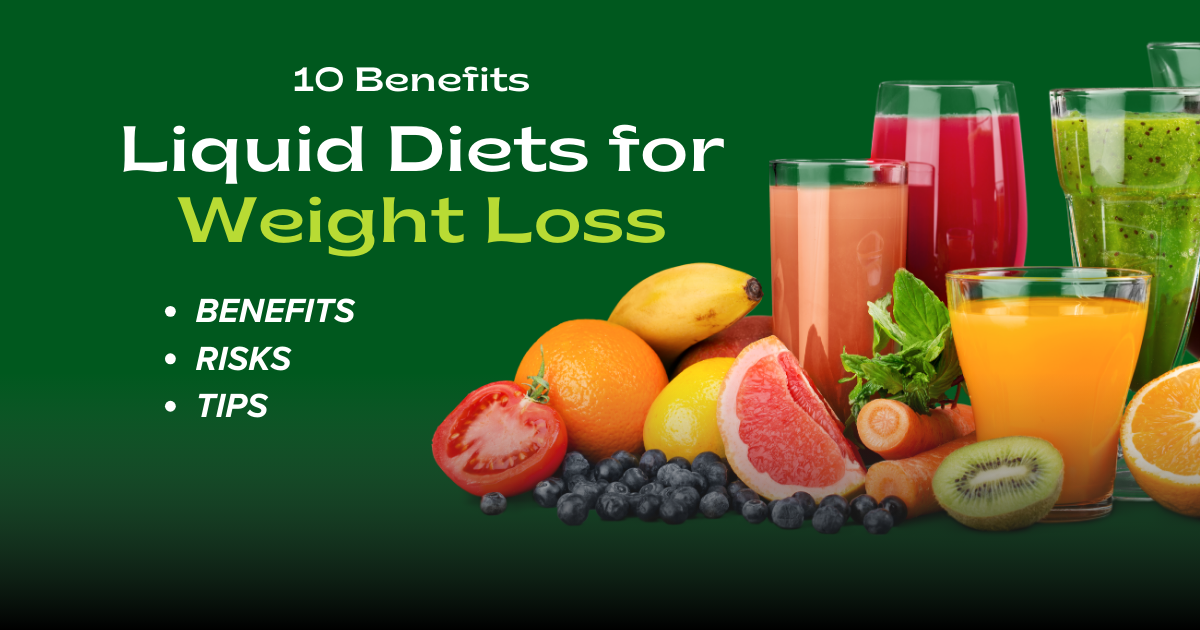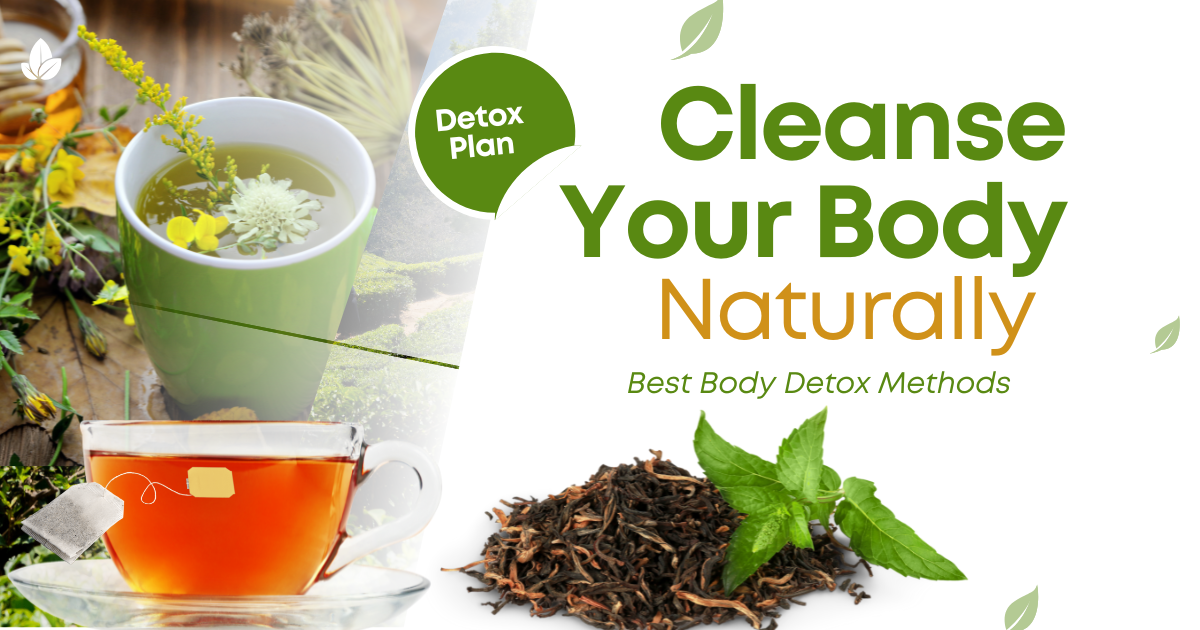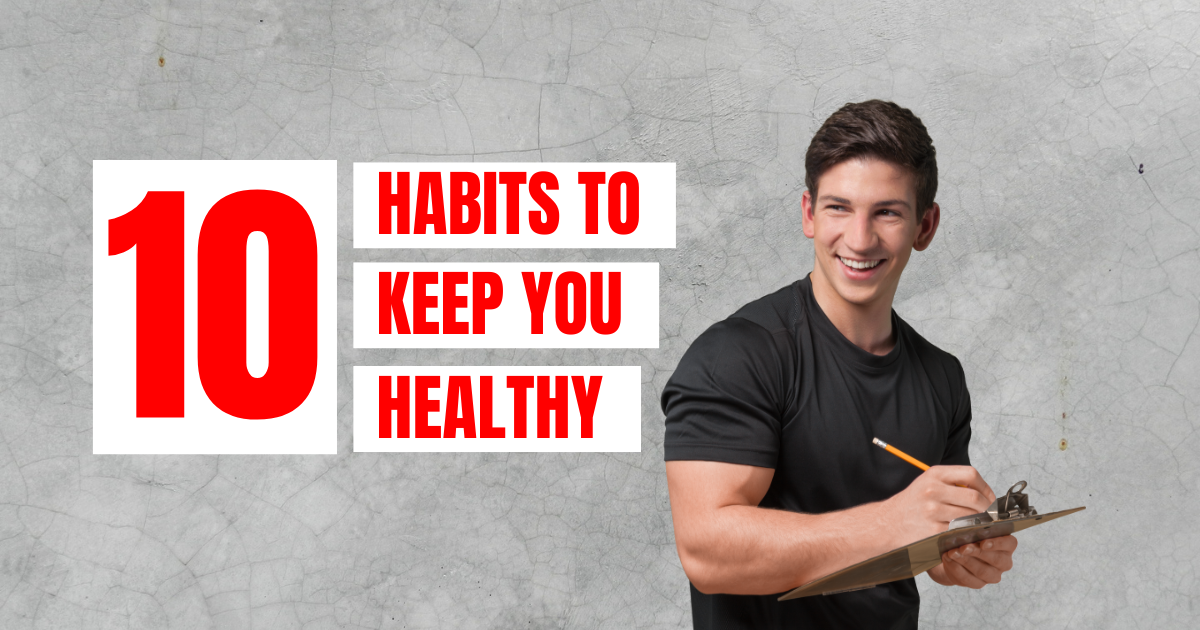Liquid diets are a popular method for quick and effective weight loss. It consists of ingesting just liquids – smoothies, soups, broths, and meal replacement shakes instead of solid food. This plan focuses on lowering the calories consumed while ensuring adequate nutrition. Liquid diets are often short-term or for detoxification; some use them for medical purposes. But it has to be done with good knowledge and care. In this blog, we will discuss liquid diets, their functioning, their advantages and disadvantages, and tips on following them safely. You’ll know if this method is for you and your weight loss journey.
Types of Liquid Diets
- Complete Liquid Diets: These include all liquids and foods that become liquid at room temperature, like yogurt, soups, and milk.
- Clear Liquid Diet: Clear liquids such as clear broths, teas, and juices without pulp.
- Meal Replacement Liquid Diets include replacing regular meals with shakes or smoothies that are high in nutrients.
- Detox liquid diets: Drink juice or smoothies to purify your body from toxins.
- Medically Prescribed Liquid Diets: These are usually prescribed before or after surgery to aid in healing and recovery.
Benefits of a Liquid Diet for Weight Loss
- Rapid Weight Loss: The caloric intake will be considerably reduced, resulting in rapidly fast results.
- Digestive Rest: Gives the digestive system a break from processing solid foods.
- Convenience: They are quick and easy to make and eat, making it less time-consuming as compared to cooking a meal.
- Detox Benefits: Certain liquid diets help cleanse the body of toxins, benefiting health.
- Hydration Boost: Most liquid diets consist of water-rich foods, which increase water intake in the body.
Potential Side Effects and Risks
- Nutritional Deficiencies: Lack of essential vitamins, minerals, and fiber if not planned properly
- Loss of Muscle Mass: An insufficient protein intake may result in muscle loss over time.
- Hunger and Fatigue: With restricted calorie intake, you may feel low on energy and experience cravings.
- Long-Term Health Complications: Long-term liquid diets may complicate metabolism, bone density, and immunity.
- Risk of Weight Regain: A sudden weight loss can cause rebound weight gain once solid foods are back in the diet.
Who Should (or Shouldn’t) Consider a Liquid Diet?
Liquid diets may be ideal for:
- Those needing a medical reset (under supervision).
- Those with short-term weight loss goals may find liquid diets helpful.
- Individuals recovering from surgery or illness should consider a liquid diet under the guidance of a doctor.
Avoid Liquid Diets
Liquid diets are not for everyone, especially if you have medical conditions or situations. Do not try a liquid diet if you have chronic health issues like diabetes, kidney disease, or heart disease that can worsen over time. Pregnant or breastfeeding people should also avoid liquid diets as they need proper nutrition for both mother and child.
And if you’re not under professional supervision or are on your own, it’s better to skip liquid diets to eliminate the risk of potential health hazards.” Finally, individuals with a past history of eating disorders or any unhealthy relationship with food should not take liquid diets due to their likelihood to lead to worsening of underlying issues.
How to Start a Liquid Diet Safely
Before beginning a liquid diet, it is critical to plan ahead in order to ensure that it is safe and effective. Consult with your doctor first to ensure that a liquid diet is appropriate for your health and dietary needs. When cleared, focus on eating nutritionally balanced meals that will help prevent any vitamin, protein, or healthy fat deficiency. Instead of completely switching to a liquid diet, gradually transition to avoid digestive issues. More than anything set realistic goals for weight loss or other aspects and track where you are with your progress. And lastly, be informed of what type of liquid diet you are undertaking and know that you’re making healthy, sustainable choices.
What You Can Have on a Liquid Diet
- Slides with high-calorie liquids: Smoothies containing fruits, veggies, and protein powders according to your dietary preferences
- Broths and Soups: Opt for a low-sodium variety to help hydrate, flavor, and nourish.
- Fresh Juices: Concentrate on natural, sugar-free juices that contain vitamins and minerals.
- Hydration Drinks: These can be water, herbal teas, or electrolyte drinks used to hydrate the body.
- Fortified Shakes: Explore the option of meal replacement shakes that are fortified with essential nutrients.
Homemade Liquid Diet Recipes
- Protein-Packed Smoothie: Blend almond milk, banana, spinach, and protein powder for a balanced meal.
- Hearty Vegetable Soup: Purely boiled vegetables with vegetable stock and seasoned with herbs.
- Green Detox Juice: Blend cucumber, celery, lemon, and green apple for a refreshing cleanse.
- Oatmeal Shake: Mix cooked oatmeal, almond milk, and cinnamon for a fiber-rich drink.
10 Tips For Success On A Liquid Diet
If your goal is to succeed on a liquid diet, then you will need to use some strategies and planning to make this simple for yourself. Keeping hydrated is vital, as dehydration may affect digestion and cause stomach problems . Remember to drink plenty of water.
If you are looking for something to satisfy your cravings, go for herbal tea or flavored water instead of soda. Do light activities like yoga or take a short walk to keep moving, but don’t overdo it. Be on the lookout for signs that the new diet and eating habits are satisfying your needs in terms of going down on the scale and energy levels. Maintain your motivation throughout your liquid diet, vary your recipes, and prevent boredom in your meals.
Common Myths About Liquid Diets
Myth 1: Liquid diets are always healthy.
Reality: Some lack essential nutrients and can be unsustainable.
Myth 2: Liquid diets offer permanent results.
Reality: Weight regain is standard after returning to solid foods.
Myth 3: You won’t feel complete.
Reality: Including protein-rich liquids can help maintain satiety.
Strategies Of Losing Weight With A Liquid Diet
- Calorie-Restrictive Solid Diets: Meals that are lower in calories and well-balanced with various nutrients.
- Intermittent fasting: Alternating between periods of eating and fasting to achieve a caloric deficit
- Combining diets: the best diet for sustainability and nutrition
- Plant-based foods: High in fiber, vitamins, and antioxidants and low in calories, which promotes weight loss and overall medical health.
- Mediterranean Diets: This highly plant-based diet consisting of much fruit, vegetables, whole grains, and olive oil has been linked with better heart health, lower risk of many chronic diseases, reduced inflammation, increased cognitive function, and longer lifespan.
Real-Life Success Stories
And there are many, to hear some of the people out there who have lost lots of weight with liquid diets. In fact, Sarah did 10 pounds of protein smoothies and soups in just 2 weeks. She stresses the importance of drinking plenty of water and speaking with a dietician. In the same spirit, John had a detox juice plan for a week and felt relieved and light but mentioned not being too fast to switch back to solids.
When to Stop a Liquid Diet
Knowing when to stop is equally important if you’re considering a liquid diet.
- Signs to Watch For: Extreme fatigue, dizziness, or poor performance are red flags to discontinue the diet immediately. These symptoms indicate that your body might not be receiving enough nutrients.
- Transition Back Safely: Gradually reintroduce solid foods, starting with soft options like oatmeal or steamed vegetables. This ensures your digestive system can adapt smoothly without causing discomfort.
- Listen to Your Body: Always pay attention to how you feel. If you experience persistent weakness, nausea, or other concerning symptoms, consult a healthcare provider without delay. Your well-being should be the priority.
Frequently Asked Questions (FAQs)
How much weight can I lose?
Results vary, but short-term diets can lead to 5-10 pounds weekly.
Can I exercise on a liquid diet?
Stick to light activities; avoid intense workouts that require high energy.
How long should it last?
Most liquid diets are safe for up to two weeks under supervision.
Is a liquid diet suitable for everyone?
No, consult a professional to determine if it aligns with your health needs.
Conclusion
A liquid diet can help you lose weight if you are careful and ensure that you have everything you need. While it is fast-acting, you’ll want to weigh the risks and ensure it aligns with your lifestyle. Always consult a doctor or nurse before getting started. By the time you get to the end of this guide, you will have enough information to determine whether or not a liquid diet can help you achieve your weight loss goals.
Another common method of losing pounds involves consuming the majority of your food as liquids, such as smoothies, soups, broths, and meal replacement shakes. Some benefits include rapid weight loss, resting your digestive system, and removal of toxins. However, they can still cause nutrient deficiencies, muscle loss, hunger, fatigue, and weight gain. Consult a medical doctor, set achievable goals, and drink lots of water.





